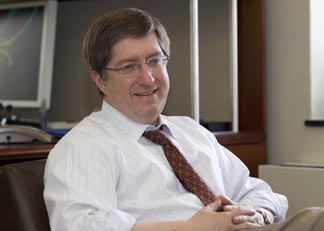President Lehman, philosophical yet saddened, explains his decision to leave

President Jeffrey Lehman sat calmly in his office on a sunny afternoon, three days after his stunning State of the University address on June 11, when he announced he would be relinquishing the Cornell presidency at the end of this month.
The president's office on the third floor of Day Hall was the calm at the center of the storm generated by the announcement. The resignation of an Ivy League president is national news, even more so when the news media are caught unawares. The New York Times, Associated Press, The Chronicle of Higher Education and other media had already covered the story and were still digging. The Ithaca Journal had run almost three full pages of coverage of the resignation, and in an editorial titled "East Hill Quake Rattles the Region," the paper worried about what Lehman's departure means for the local region.
The Cornell Daily Sun Web site posted numerous comments from students and alumni. Many offered speculative reasons why a rift had occurred between Lehman and the Board of Trustees: the "Redbud Woods" parking lot controversy, the recent departure of a distinguished vice president, differences over Lehman's transnational vision and the direction he was articulating in his three themes -- life in the age of the genome, wisdom in the age of digital information and sustainability in the age of development.
As speculation, dismay and sincere concern for the stability of the university swirled around campus and everywhere in the real and cyber worlds in which Cornellians gather, Lehman and his staff were continuing the work of the university. On June 13 he had spoken at a meeting of Tompkins County Area Development (TCAD) and assured community leaders that Cornell's efforts to support regional economic vitality will continue unabated.
The following day he sat down in his office for an interview and observed, "Cornell is a community that is working terrifically well. It is oriented toward a set of goals that are important and enduring." He was firm in stating that the fundamental goals and academic strategies being pursued by deans, faculty and staff will not change with his departure.
He dismissed speculation that he and the trustees were at odds over the direction of the university or its academic goals, or that they were unhappy over his handling of contentious local issues. "This was not about an issue, not about people or personalities. It was about a philosophical difference over how Cornell should reach our goals," he stated emphatically. "I think my departure signals an opportunity for the board to find a new president who is more in tune with their strategies for how to reach those goals."
Lehman is clearly saddened that what he views as insurmountable obstacles occurred. Being the president of Cornell was "a privilege I will treasure forever," he said. But he has always recognized that Cornell is transcendent, even more than the sum of its individual parts. "I don't believe that I have changed Cornell during my time back on the Hill but I do think that I have seen some qualities here that were here before I arrived and will be here after I have left," he said. "I had an amazing opportunity to get to know Cornell and its remarkable people in a way that very few people do."
He rejected speculation that the job was too rigorous, that he had become burnt out by a relentless schedule of meetings, events and decision-making.
"I actually draw energy from the pace of this job. I have long been someone who absorbs enthusiasm and energy from other people," he said. "That has been one of the great pleasures of being president. It offered me the great opportunity to satisfy areas of my curiosity and my personality I had not tapped into before."
And he clarified the view that what has become known around campus as "Lehman's three themes" were, in fact, not his priorities alone. "The three themes didn't spring full blown from my head like Pallas Athena [who sprang fully grown from the forehead of her father Zeus, in Greek mythology]," he explained. "They emerged from the Call to Engagement and are descriptive of strengths and special virtues that are here already. Asking Cornell to respond to those three challenges is doing no more than to ask Cornell to be itself."
He added, "So many professors have told me that one or another of these themes resonates with their work that I expect that they as individuals will continue to find them useful. As I indicated in my State of the University address, Cornell is about more than just those three themes. They are examples of the ways in which our collaborative culture and disciplinary breadth can allow Cornell to do special things."
Reflecting on his presidency, he said, "During my two years as president my goal first and foremost was to understand Cornell more deeply. I wanted to find a way to describe what makes this university so unique and so remarkable and to share that description with the entire community and see if it resonated. I believe that the beloved and revolutionary aspects of Cornell are bound up with one another. We love Cornell for its courage, for its willingness to be more open, more inclusive and more willing to explore sectors of the intellectual universe that other universities neglect."
"Beloved." "Revolutionary." Lehman used those words to describe Cornell in his inauguration address on the Ithaca campus two years ago. It was a theme he has often returned to during the past two years, and he said he hopes those aspects of Cornell will continue to be recognized and cherished.
"I'd like to be remembered as a president who brought the community together for a moment to think about what Cornell means for the world."
Media Contact
Get Cornell news delivered right to your inbox.
Subscribe